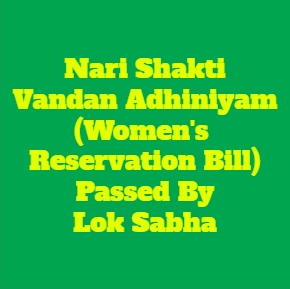

By Sunil Garodia
First publised on 2023-09-20 15:17:24
The women's reservation bill, named Nari Shakti Vandan Adhiniyam, was passed by the Lok Sabha with a thumping majority today after a day long debate in which several MPs from both the treasury and the opposition benches made their point. There were 454 votes in favour of the bill and only two against.
The opposition generally made two strong points - why was a sub-quota for OBCs not made in the overall quota and why was the government pushing back the implementation of the bill to after the carrying out of the census and completion of the delimitation exercise? Both are valid points and the government replied to both points raised by, among others, Sonia Gandhi, Rahul Gandhi, Kanimozhi and Supriya Sule.
Let us take the second point first. The government said that once the census was completed (which it said would start soon after the 2024 elections), the delimitation exercise would follow. It was only after the Delimitation Commission (DC) had completed the exercise that it would decide which seats to reserve for women. The government said that the DC was the authorized body to decide on these matters and the government would not like to force its hand or do things itself. On the lighter side, home minister Amit Shah said that the government will be accused of bias if, for instance, it were to reserve Wayanad (Rahul Gandhi's constituency) or Hyderabad (Asasuddin Owaisi's constituency) for women. Although this is going to push the implementation of reservation to 2029, this is the best and fairest way forward.
As for reservation for OBCs, the government took pains to point out that it had already declared a sub-quota of 33% for women from SC/ST communities. It said that any further tinkering with the quota-within-quota would bring demands from various quarters for reservations for Muslim women and other sub-categories.
The opposition must not indulge in politicking. If it is concerned about representation for OBC women, it can give tickets to women from those communities within the overall quota to ensure their representation. Demanding separate sub-quota within the overall quota will lead to other demands and finally take away the impact the bill will have in the composition of the two houses of Parliament and state legislatures once it is implemented. But the opposition parties need to be applauded for not letting their demands come in the way of the passage of the bill in the Lok Sabha.











